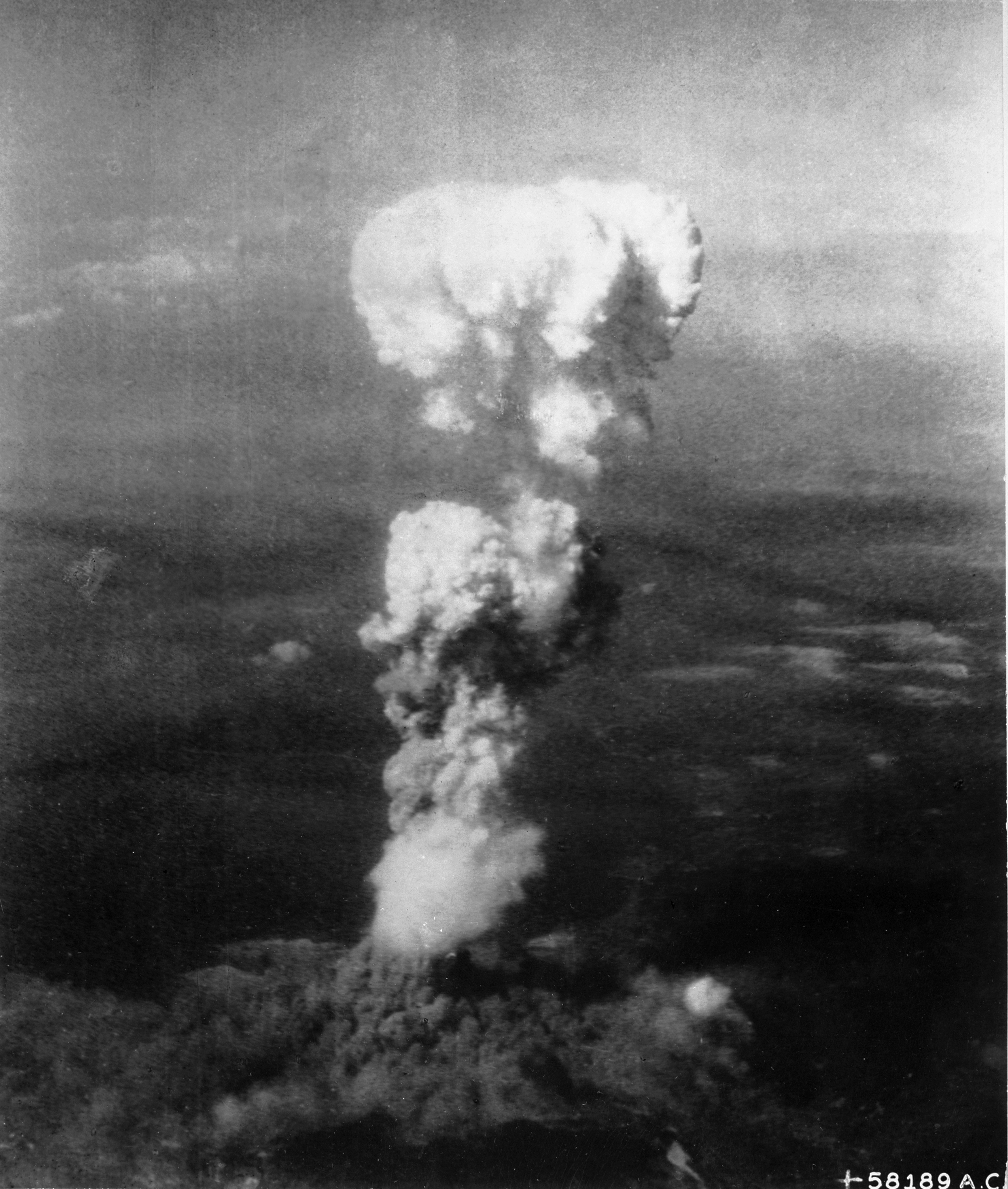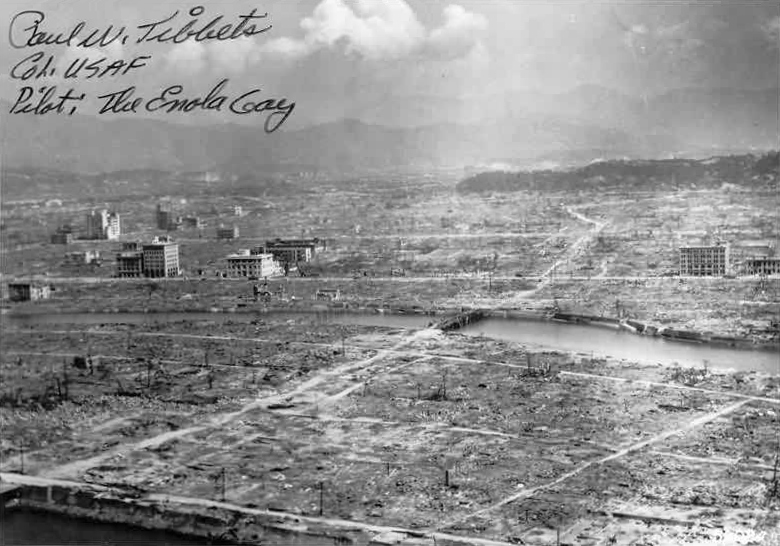

Wait, one of the most horrible bombings in history saved lives? What if we'd just laid down our arms, isn't it U.S. aggression that causes all the trouble in the world? I mean, if we would just leave the rest of the world alone, they'd leave us alone! There must have been a diplomatic alternative.
Diplomacy only works if you have might on your side. Might doesn't make right, as some people say, but if you are on the side of right, you have the responsibility to do all in your power to see that right prevails. If we had decided not to drop nuclear bombs, would the Japanese or Germans have had any such scruples to keep them from nuking the U.S.? Now that we've won, we know that neither power was as close to developing the bomb as we had thought, but they were working on it, and it was in their interest to make us believe they were close. Both Germany and Japan were bent on conquering the world, and the unprovoked attack on Pearl Harbor was intended to keep the U.S. out of the way, since we would eventually have been compelled to join the war at some point anyway.
Weren't the Japanese ready to surrender before we nuked them, though? Well, yes, but any surrender other than unconditional surrender is unacceptable. Had we accepted surrender conditions favorable to Japan, it would only have been a matter of time before they gathered their strength and renewed their military campaign, and all the while innocent civilians would have continued to die in China. Aside from that, the Japanese government was not unified in discussing surrender, with most officials hoping the war would last until the U.S. was forced to invade Japan on the ground, and that they could inflict enough casualties to come to a settlement favorable to Japan. Germany and Japan are no longer threats to the world because we and our allies completely destroyed their ability to wage war on the world. Now our relations with these two countries are no worse than our relations with, say, france (the ungrateful nation whose butts we saved. Sarkozy understands, at least.) or Spain. Japan and Germany are the nations they are today because we completely broke them, then helped them to rebuild. No other nation in the world does that*.
But just like Afghanistan and Iraq, they were only protesting American Imperialist Capitalism! America tortures people and kills innocent civilians! Well, in war, civilians die. If you refuse to accept civilian casualties, you will lose the war, and the world is a better place because Hitler and Hirohito were not on the winning side. It is actually an amazing thing, maybe miraculous, that we do win wars while doing all we can to avoid unnecessary civilian deaths. Guess who was going after civilian deaths deliberately? The Holocaust was bad enough, but Japanese atrocities in China were even worse. The two atomic bombs we dropped did kill thousands of civilians, but they saved millions of lives over all. As horrible as the bomb was, it was the morally right but very difficult decision to use it.
The bushido warrior code was deeply ingrained into the Japanese soldiers, who were trained to die rather than surrender. Most Japanese soldiers preferred to take their own life rather than be taken prisoner. Additionally, the Japanese were engaged in total war, with all civilians, women and children alike, participating in the war effort in some way, and they were determined to fight to the end no matter the cost.
"The entire public, in effect, became subject to call-up under the Volunteer Enlistment Law, which applied to all men ages 15 to 60 and all women ages 17 to 40.... What this sea of civilians lacked besides training were arms and even uniforms. A mobilized high-school girl, Yukiko Kasai, found herself issued an awl and told: 'Even killing just one American soldier will do. You must prepare to use the awls for self-defense. You must aim at the enemy's abdomen.' Many civilians found themselves drilling with sharpened staves or spears. Japan lacked the cloth to put those civilians into uniforms -- one senior general spoke of his hope to provide them with patches on their civilian clothes. This lack of distinguishing identification would undoubtedly have made it impossible at normal combat range for a soldier or Marine to identify which civilians represented the Japanese armed forces and which did not, a sure prescription for vast numbers of deaths. At least one Fifth Air Force intelligence officer took the Japanese at their publicly broadcast word of total mobilization and declared in a July 21 report, 'The entire population of Japan is a proper Military Target...THERE ARE NO CIVILIANS IN JAPAN."
(Richard B. Frank; Downfall: The End of the Imperial Japanese Empire)
The Japanese planned to fight a major battle on the mainland, prepared to suffer tremendous losses under the premise that American morale couldn't stand up to such heavy losses (a similar strategy to the guerilla tactics employed by terrorists in Iraq, hoping that mounting losses will prompt us to pull out of the war). Dropping the bombs, with the promise of more to come, prevented this, saving tens of thousands of American lives and millions of Japanese lives. Estimates run from 400,000 to 800,000 American deaths, and five to ten million Japanese deaths from a mainland invasion, compared to an upper estimate of 200,000 killed between the two atomic bombs. The Japanese also threatened to kill all POWs if the mainland were invaded.
That's just in Japan; as I mentioned before, the Japanese military was committing atrocities in China that out Hitlered Hitler. There were of course the Bataan and Sandakan Death Marches, which resulted in over 10,000 deaths, but that is nothing compared to what was done to civilians. The Japanese routinely murdered Chinese civilians, including women and children (if you want pictures, they're on the internet and in books, I won't post them here).
"For China alone, depending upon what number one chooses for overall Chinese casualties, in each of the ninety-seven months between July 1937 and August 1945, somewhere between 100,000 and 200,000 persons perished, the vast majority of them noncombatants. For the other Asians alone, the average probably ranged in the tens of thousands per month, but the actual numbers were almost certainly greater in 1945, notably due to the mass death in a famine in Vietnam. Newman concluded that each month that the war continued in 1945 would have produced the deaths of 'upwards of 250,000 people, mostly Asian but some Westerners.' What is clear beyond dispute is that the minimum plausible range for deaths of Asian noncombatants each month in 1945 was over 100,000 and more probably reached or even exceeded 250,000. Any moral assessment of how the Pacific war did or could have ended must consider the fate of these Asian noncombatants and the POWs."
(Richard B. Frank; Downfall: The End of the Imperial Japanese Empire)
Of course, the personal reason I have for being glad of these bombs is that had we invaded the mainland, possibly the entire Marine Corps. including my grandfather would have been lost. Japan forced the end of the war to play out as it did, with their total war tactics, and it is good that we had a president with the courage to make such a difficult decision. The revisionist historians say the bombs were immoral and unnecessary; I disagree. I do, however, think it's good that none since has ever been used aggressively.
Incidentally, August 6th is also International Friendship Day.
*For a hilarious story related to this fact, read "The Mouse that Roared." It's short, and very good.
2 comments:
I happen to agree with your opinion on this one. I think we are very fortunate that we were the ones who were able to develop and deliver the two nuclear bombs to Japan. CNN and Headline News' media coverage gives me the feeling that Japan remembers those lost in the bombings, but not the reason the bombs were dropped.
It may be a little mean spirited, but I think that Japan should also put more emphasis on the reasons that they were bombed.
Maybe they do, but from what I see in the news, I don't think they do.
Wow, I am surprised that you agree with this one, thanks for your comment.
I don't know what the situation is now, but as I understand it, for quite awhile Japanese children were taught that they won the war, or at least that it was American aggression and cruelty that started and ended it. You're right on about CNN, etc.; but it's America also that has forgotten the reason.
About a decade ago there was a set of commemorative stamps released each year for the 50th anniversary of WWII. The final set was supposed to include a big mushroom cloud, but Bill Clinton asked the Post Office not to release that one because it would be insensitive to Japanese Americans and Japan in general. Totally lame. Fortunately, they released it anyway, but not as official postage, just a collectors' item.
Post a Comment